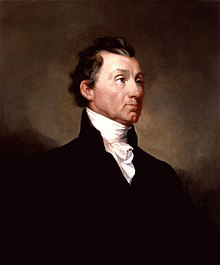

President of the United States
April 28, 1758 Monroe Hall, Virginia, British America
July 4, 1831(1831-07-04) (73) New York City, U.S.
March 4, 1817 – March 4, 1825
5th president of the United States (1817–25) This article is about the 5th president of the United States. For other people with the same name, see James Monroe (disambiguation). "Senator Monroe" redirects here. For other uses, see Senator Monroe (disambiguation). James MonroePortrait by Samuel Morse, c. 18195th President of the United StatesIn office March 4, 1817 – March 4, 1825Vice President Daniel D. TompkinsPreceded by James MadisonSucceeded by John Quincy Adams7th United States Secretary of StateIn office April 6, 1811 – March 4, 1817PresidentJames MadisonPreceded by Robert SmithSucceeded by John Quincy Adams8th United States Secretary of WarIn office September 27, 1814 – March 2, 1815PresidentJames MadisonPreceded by John Armstrong Jr.Succeeded by Alexander Dallas (acting)12th and 16th Governor of VirginiaIn office January 16, 1811 – April 2, 1811Preceded by George W. Smith (acting)Succeeded by George W. SmithIn office December 28, 1799 – December 1, 1802Preceded by James WoodSucceeded by John Page4th United States Minister to the United KingdomIn office August 17, 1803 – October 7, 1807PresidentThomas JeffersonPreceded by Rufus KingSucceeded by William Pinkney5th United States Minister to FranceIn office August 15, 1794 – December 9, 1796PresidentGeorge WashingtonPreceded by Gouverneur MorrisSucceeded by Charles Cotesworth PinckneyUnited States Senator from VirginiaIn office November 9, 1790 – May 27, 1794Preceded by John WalkerSucceeded by Stevens Thomson MasonDelegate from Virginia to the Congress of the Confederation In office November 3, 1783 – November 7, 1786Preceded by Constituency establishedSucceeded by Henry Lee III Personal detailsBorn(1758-04-28 ) April 28, 1758 Monroe Hall, Virginia, British AmericaDiedJuly 4, 1831(1831-07-04) (aged 73) New York City, U.S.Cause of deathTuberculosisResting placeHollywood CemeteryPolitical partyDemocratic-RepublicanSpouse(s)Elizabeth Kortright (m. 1786 ; died 1830 )Children3, including Eliza and MariaEducationCollege of William & MaryOccupationPoliticianlawyerSignatureMilitary serviceBranch/service Continental Army Virginia Militia Years of service 1775–1777 (Army) 1777–1780 (Militia) Rank Major (Army) Colonel (Militia) Battles/wars American Revolutionary War Battle of Trenton (WIA) James Monroe (/m ə n ˈ r oʊ / ; April 28, 1758 – July 4, 1831) was an American statesman, lawyer, diplomat and Founding Father who served as the fifth president of the United States from 1817 to 1825. A member of the Democratic-Republican Party, Monroe was the last president of the Virginia dynasty; his presidency coincided with the Era of Good Feelings. He is perhaps best known for issuing the Monroe Doctrine, a policy of opposing European colonialism in the Americas. He also served as the governor of Virginia, a member of the United States Senate, the U.S. ambassador to France and Britain, the seventh Secretary of State, and the eighth Secretary of War. Born into a planter family in Westmoreland County, Virginia, Monroe served in the Continental Army during the American Revolutionary War. After studying law under Thomas Jefferson from 1780 to 1783, he served as a delegate in the Continental Congress. As a delegate to the Virginia Ratifying Convention, Monroe opposed the ratification of the United States Constitution. In 1790, he won election to the Senate, where he became a leader of the Democratic-Republican Party. He left the Senate in 1794 to serve as President George Washington's ambassador to France but was recalled by Washington in 1796. Monroe won the election as Governor of Virginia in 1799 and strongly supported Jefferson's candidacy in the 1800 presidential election. As President Jefferson's special envoy, Monroe helped negotiate the Louisiana Purchase, through which the United States nearly doubled in size. Monroe fell out with his longtime friend James Madison after Madison rejected the Monroe–Pinkney Treaty that Monroe negotiated with Britain. He unsuccessfully challenged Madison in the 1808 presidential election, but in April 1811 he joined Madison's administration as Secretary of State. During the later stages of the War of 1812, Monroe simultaneously served as Madison's Secretary of State and Secretary of War. His wartime leadership established him as Madison's heir apparent, and he easily defeated Federalist Party candidate Rufus King in the 1816 presidential election. Monroe's presidency was coterminous with the Era of Good Feelings, as the Federalist Party collapsed as a national political force. As president, Monroe signed the Missouri Compromise, which admitted Missouri as a slave state and banned slavery from territories north of the parallel 36°30′ north. In foreign affairs, Monroe and Secretary of State John Quincy Adams favored a policy of conciliation with Britain and a policy of expansionism against the Spanish Empire. In the 1819 Adams–Onís Treaty with Spain, the United States secured Florida and established its western border with New Spain. In 1823, Monroe announced the United States' opposition to any European intervention in the recently independent countries of the Americas with the Monroe Doctrine, which became a landmark in American foreign policy. Monroe was a member of the American Colonization Society, which supported the colonization of Africa by freed slaves, and Liberia's capital of Monrovia is named in his honor. Following his retirement in 1825, Monroe was plagued by financial difficulties, and died on July 4, 1831 in New York City. He has been generally ranked as an above-average president by historians.

We use cookies
We use cookies and other tracking technologies to improve your browsing experience on our website, to show you personalized content and targeted ads, to analyze our website traffic, and to understand where our visitors are coming from. Privacy Policy.